Why I’m Loving Marriage Less (And Why You Should Too)
I am trying to remove the burden of “discernment” from my readers.
In as much as I can anyway.
More than ever before, I want to put myself in the shoes of someone who hasn’t walked my lived experience in marriage. I want anyone who reads my words to know what I mean immediately. And don’t mean.
The back story
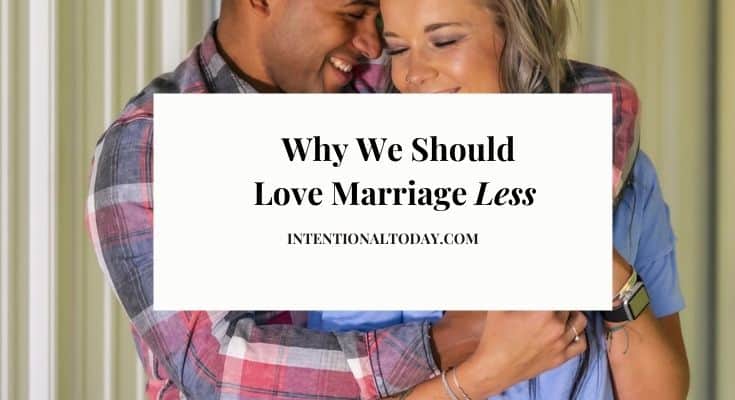
Three years ago, I got sick with a condition that resulted in severe inflammation and chronic pain, from which I’m still recovering. I went through a season of trying to understand God because what I knew about Him wasn’t answering the bottomless questions of my soul.
I turned to Scripture, learned how to study it (not just read it), and the Holy Spirit began to open up my understanding.
Around the same time, some people close to me were having severe relationship problems. I was also coaching women in difficult marriages and responding to emails and comments from women (and a few men) trying to make sense of their difficult marriages.
Then Sheila Gregoire came out with a groundbreaking, in-depth survey of over twenty thousand women.
And everything clicked.
Loving Marriage Less: When Everything Clicks
We’ve had long discussions with my husband (seriously, one conversation on lust lasted four hours), and I now know some of my beliefs around marriage were broken. See an example in this post Do Wives Owe Husbands Sex?
My core beliefs haven’t changed, but some of the surrounding narratives have radically shifted, especially those originating from culture. If you follow me on Facebook and Instagram, you may have seen me talk about the cultural scripts we follow and how they affect our relationships.
In the past, I made some assumptions in my writing.
For example, if I wrote about empathy in marriage, I assumed every reader understood we don’t empathize with sin or unhealthy behavior. I assumed that everyone who reads my words understood the “unsaid obvious.”
To be clear, I am not a licensed therapist, and I do not provide diagnosis, therapy, counseling, treatment, or mental care services. My blog, teaching, and books exist for educational purposes, and where expert and licensed assistance is required, individuals are to seek the services of a licensed professional.
That said, I do want to be a good steward of what I know. I’m growing, and I want to keep sharing my growth with you.
Why We Should Love Marriage Less
In the early days of this ministry, I focused on encouraging spouses, specifically women, on loving marriage.
These days, however, I’m focused on encouraging spouses to love marriage a little less. Not because I’ve become (or I’m planning to become) anti-marriage but because I am now pro-healthy marriage.
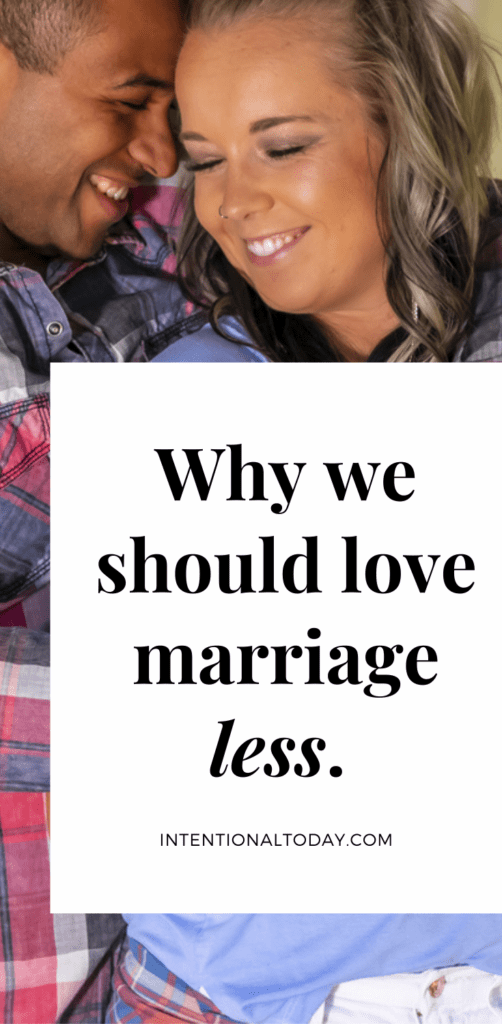
I want husbands and wives to pull their weight in their relationship. And so in all my writing, I want to be super clear that marriage is not the place where we can get away with unkindness, disrespect, dishonor, or a lowered standard by calling it “the challenges of married life.”
I want couples to know that if a partner is not Christ-like in the intimate space where Christ’s love should be most evident, if they are not doing the work so their relationship can look more like the kingdom of heaven and less like the kingdom of the world, they are deceived. “But be doers of the word, and not hearers only, deceiving yourselves” James 1:22
And as the suffering, persevering spouse, you do not need to be deceived with them.
Both spouses must be held to the same standard: There’s no standard for wives and another standard for husbands.
God takes the marriage commitment seriously. But never at the expense of the people in it.
That ought to give us a pause: God values marriage (it was He who said a man should not be alone, after all), but He doesn’t position it above people. When we place marriage above people, we deviate from God’s standard.
Loving Marriage Less: What I Want Couples To Know
I want newlyweds (and newlywed wannabes) to establish their marriage on a junk-free foundation. I want them to know that marital love should deeply value individual health, joy, and dreams.
I want them to know that marriage won’t thrive when one spouse (typically the husband, though not always the case, sometimes it’s the wife on the pedestal) is most prioritized.
Christian couples need to know that God is not a miracle pill – we need to do the work. A marriage is unfix-able unless the individual with the problem takes ownership.
What turns an unhealthy marriage around isn’t the faith or patience of a suffering spouse. What turns an unhealthy relationship around is the change and transformation of an unhealthy spouse.
When they choose confession, growth, healing, accountability, that’s what begins to turn things around—spouses who are suffering need to stop carrying burdens that aren’t theirs to take.
We need to tell the truth. Many individuals who pursue divorce are not running away from fabulous spouses. They are not resting in enjoyment and thrill at the ending of their relationship.
They are broken, humiliated, and traumatized.
Quite often, going public about the status of their marriage (which their spouse has sabotaged and ended by their toxicity, unrepentant sin, or abuse) is one of the most challenging things they’ve ever had to do.
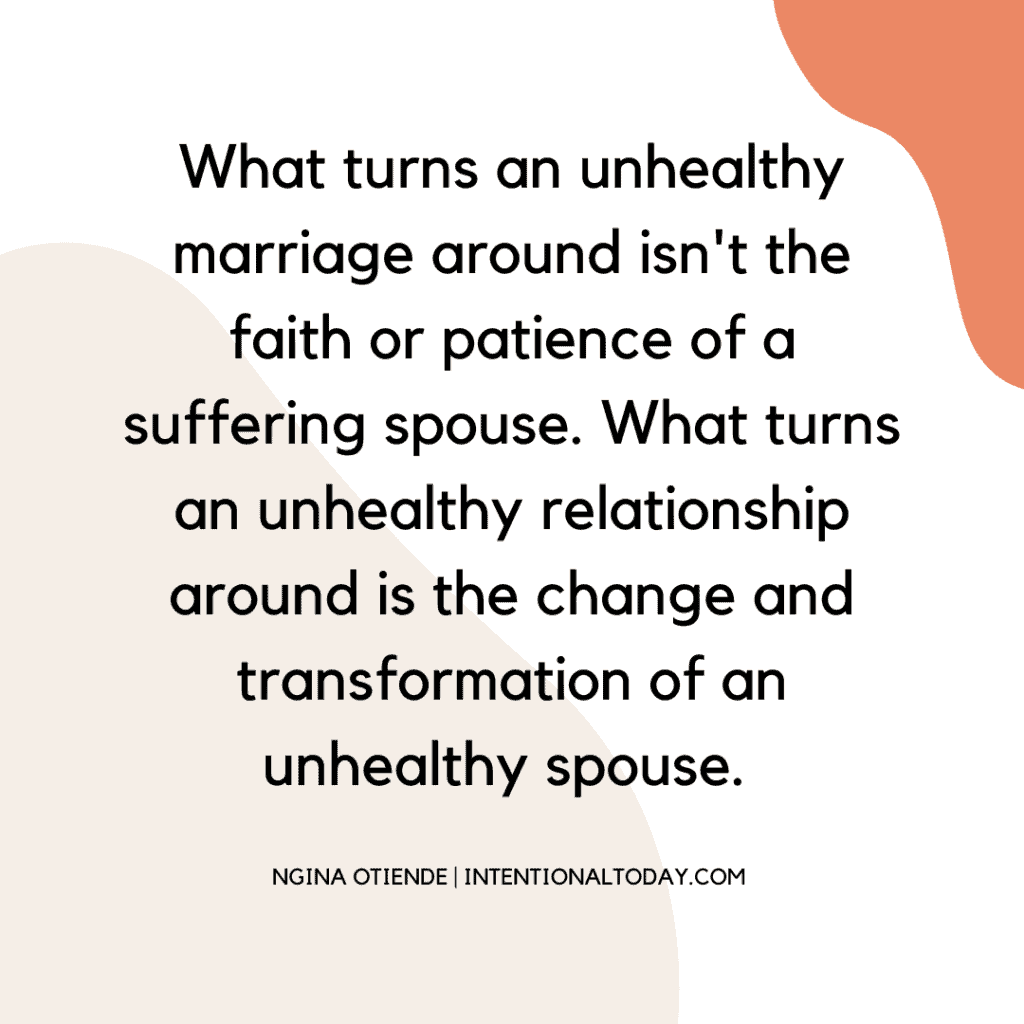
As the body of Christ, we need to understand that divorce can be life-saving. It can be the start of healing and health and is very much in line with God’s plan. Not because God authored the pain and devastation but because He’s a God of justice, comfort, and healing.
I want couples to love God and His values more. To love marriage less because marriage is not our first ministry. Our devotion to Christ is. His standard ought to instruct everything, including our relationships.
How To Love Your Marriage Less
Here are five tips to help you aim higher.
1. Love God and His Kingdom (His ways.)
“Now great crowds accompanied him, and he turned and said to them, “If anyone comes to me and does not hate his own father and mother and wife and children and brothers and sisters, yes, and even his own life, he cannot be my disciple. Whoever does not bear his own cross and come after me cannot be my disciple. Luke 14:25-27 ESV
Filter your life and relationship through the lens of what honors God.
Ask yourself “What speaks “kingdom of God,” not “kingdom of popular opinion,” “kingdom of culture,” “kingdom of my husband and I”? When marriage problems pop up, what does preferring God over everything else look like?
2. Love marriage less when you expose yourself to people who are different from you.
Read blogs and books that make you uncomfortable. You don’t have to agree with everything to learn something.
If you consider your marriage healthy, all the more reason to look outside your blissful state and to hold this knowledge because you’re being equipped to discern and call out unhealthy behavior in your community. And become a rock and cheerleader to those who need your support.
A few favorites to check out:
- Hope For Hurting Wives
- Flying Free with Natalie Hoffman
- Life Saving Divorce with Gretchen Baskerville
- To Love Honor and Vacuum with Sheila Gregoire
- Leslie Vernick
- Patrick Weaver Ministries
- Elisabeth Klein
- Sarah McDugal
3. STUDY your Bible.
If you’re used to drive-by Bible reading where you read the Bible with yourself in mind or intending to find an encouraging verse for the day, consider what else you might be missing in your knowledge and study of who God is.
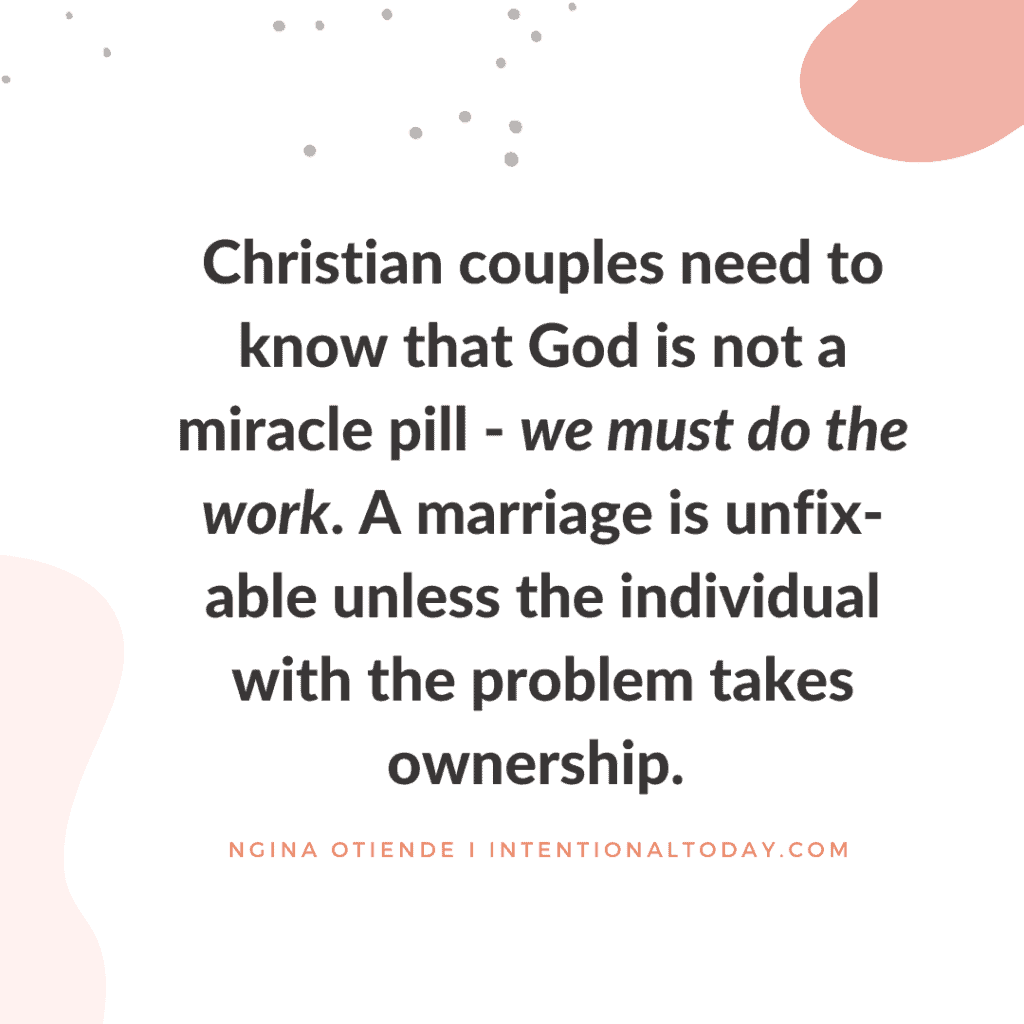
Remember, we’re not the central figures in the Bible. God is. When we don’t read the Bible with that in mind, we tend to make it about ourselves.
When we don’t read with a context or through the lens of history (seeing the Bible through the eyes of the initial hearers), we run the risk of misunderstanding Scripture. And when we do, we misunderstand everything else, marriage included.
To help you get started in your study of Scripture, check out these two books on Amazon.
- Women of the Word by Jen Wilkin
- How to Study Your Bible by Kay Arthur, David Arthur, and Pete De Lacy
- Also, check out Phylicia Masonheimer, who is a public theologian.
4. Be ready to be uncomfortable.
Asking questions about long-held beliefs can be excruciating.At least it was for me.
When you get uncomfortable, remember that investigating your beliefs might still lead you to the same conclusions you’ve had all along.
But here’s the good news – you’ll now have a basis for what you believe, and that makes all the difference.
Related Posts
5 Things I Wish I knew About Healthy Sex in Marriage
The Bad News About Marriage – 7 Ways A Relationship is Bad For You
5. If your spouse is safe and willing, make a habit of discussing new topics of interest.
Check-in with them, find out their perspective, share what you’re learning.
These don’t need lengthy discussions, just bits and pieces in the course of the day or evening as your time and margins allow. Grow together.
Loving Marriage Less
Because of what I’ve been through in the last three years, the gaps I’ve observed, and the horror of destructive relationships, I am no longer comfortable being pro-marriage. I want to be pro-healthy marriage. There’s a difference.
I also know that many married couples think they are having “normal marriage problems” when they are experiencing severe individual issues.
I hope that by writing more about that and sharing resources and insights, more spouses will have the courage and strength to make the right decisions for their lives.
"1 in 4 women and 1 in 9 men experience severe intimate partner physical violence, intimate partner contact sexual violence, and/or intimate partner stalking with impacts such as injury, fearfulness, post-traumatic stress disorder, use of victim services, contraction of sexually transmitted diseases, etc." Source
Rethinking Our Faith
Recently, I got to hang out with the fabulous Sheila of To Love, Honor, and Vacuum blog, and we talked about rethinking our faith, questioning long-held beliefs about God and marriage, and how that can change things.
I also shared my journey, why I’m no longer cheering for people to stay married but aiming for something higher. I join the convo at 29.00, but please watch the whole thing! Rebecca (Sheila’s daughter) is🔥Watch here. Or listen to the podcast.
Resources
If you are not sure you are in an abusive marriage, check out the dynamics of abuse here
If you need to create a safety plan, click here
For anonymous, confidential help, call the National Domestic Violence Hotline at 1-800-799-7233 (SAFE) or browse their website for free help.

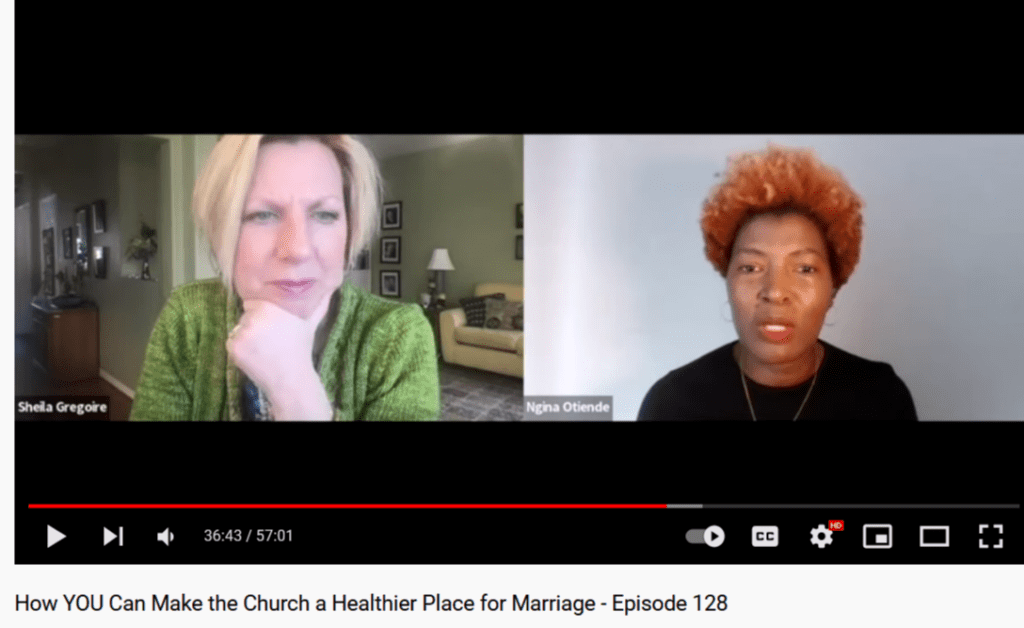
I deeply appreciate your willingness to examine and change your teachings to more fully reflect the heart of God!
I suggest adding Leslie Vernick, author of “The Emotionally Destructive Marriage,” to your list of resources for abused spouses. (leslievernick.com)
Amen. I have Leslie on my list of recommendations in my resources page but yes, I’m’ gonna add her to this post as well!